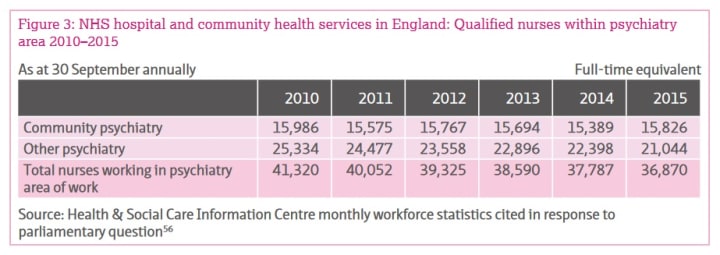Good Enough? - The Metaphorical Mountain
The Mental Health Stigma

I. The Metaphorical Mountain
When we are young, we lack the life experiences we will later acquire. As teenagers we have only lived less than a quarter of our lives. Therefore we do not have much to hold in comparison, and it is difficult to gain perspective. So as teenagers all problems and all joys seem to be—and feel to us—a very big deal. I think this is why as youngsters we always have big reactions, where everything is part of this huge drama called life. We don’t yet have the life experience to compare our current circumstances against anything and say, "Well at least it’s not as bad as that one time when…." Or "This is up there with the best days of my life, along with …. and …."
Everything is a big deal. Its life or death. And nobody understands.
"Teenagers really get a bad time. It is amazing how it seems to be totally acceptable—even institutionalised—to parody and demonise them. We laugh at things that mock teenagers, but if you applied those sorts of jokes to any other sector of society, it just wouldn’t be acceptable," Sarah-Jayne Blakemore, a professor of cognitive neuroscience and deputy director of the University College London Institute of Cognitive Neuroscience told The Telegraph online edition in February 2015.
And it’s true. She goes on to back up this bold statement with her research on brain development in adolescence. So nobody does understand teenagers, not really. Their brains are changing and as such they feel the impact more, I see similarities here between the teenage brain and an anxious brain.
Drawing on my own adolescent experiences, if I had (what I felt was) a big deal, I was told not to make mountains out of mole hills. There are other phrases though—Primadonna or Bleeding Ballerina for example. These phrases are about playing the emotions of the situation down, like turning the hob down to stop the dinner burning. Sounds simple doesn’t it?
Mountains out of mole hills was a mantra that followed me into adulthood. Whenever I found myself under stress for prolonged periods, or felt very upset, senses and feelings that were unpleasant, I had to tell myself—"It’s not that bad, you’re making mountains out of mole hills." Whereas situations that brought on sensations and feelings of happiness I let loose to run free. Because these feelings were what were considered acceptable to display. They were just as strong as feelings of utter anguish but without the associated stigma.
At one time when I was really struggling to be "normal," I did the forbidden and confided in a friend. She is a very clever friend, and she told me that if something felt like it was important and it was "a big deal" to me then that’s probably exactly what it was. With that I suddenly came to a startling realisation. That for the better part of my life I had been making mountains INTO mole hills.
A mantra is by definition a word or phrase that is repeated often or that expresses someone's basic beliefs. You’ll see plenty of self-help books that tell you to adopt a mantra, to use as you feel required, or commonly to say to yourself in the mirror in the morning before you begin your day. Things like "You are beautiful," every day, until you feel and believe it. Positive self-talk. That voice inside your head has a huge impact on who you are and how you live your life. So they ask you to talk kindly to yourself, to incorporate it into your daily routine, make a habit of it. And I guess this is why Cognitive Behavioural Therapy also known as CBT or talking therapies, are a tried and tested treatment for mental illness such as depression. A large part of CBT treatment addresses "Thinking Errors."
I first came across thinking errors one summer when my husband was signed off from work with depression. A psychiatric nurse had given him an A4 print out of thinking errors and alternatives to use instead that promoted positive thinking. As I read through the list I realised I was also guilty of a lot of them, and I’m pretty sure that most people would be to. The list included examples such as "I can’t do it" to become "I will give it a try."
In a way, this is close to what I thought I was doing with my mantra. But I had made a mistake, I am after all only human. As are you.
It is my hope that many people will be able to relate and know that they are not alone. Mind, the well-known charity for mental health, released some statistics that state one in four people in the UK will experience a mental health problem each year. Every seven years a survey is done in England to measure the number of people who have different types of mental health problems each year (last published in 2009) and that 4.7 in 100 people experience anxiety and 9.7 in 100 people experience a mix of anxiety and depression.
A lot of people may feel that these issues are increasing, whereas the reality is—as stated by Mind—that "The overall number of people with mental health problems has not changed significantly in recent years, but worries about things like money, jobs and benefits can make it harder for people to cope."
It is also important to say here that I am not an expert by any stretch of the imagination. I am just a person attempting to live my life to its fullest. Right now I am climbing a metaphorical mountain, the higher I get the more exposed I feel, but also the better my view of the world becomes.
Each of us has their own mountain to climb and all we can do is wish each other well on our journeys.

The Mental Health Network has produced a short fact sheet summarising key facts and trends related to mental health problems (published in March 2016).
"Time to Change’s Attitudes to mental illness 2014 report illustrated that attitudes towards mental health problems are continuing to change for the better. The number of people acknowledging that they know someone lose to them who has had a mental illness increased from 58 per cent in 2009 to 65 per cent in 2014. Forty per cent of people surveyed said they would be comfortable talking to their employer about a mental health problems, although nearly half (48 per cent) said they would feel uncomfortable, showing that there is still some way to go to improve attitudes."







Comments
There are no comments for this story
Be the first to respond and start the conversation.